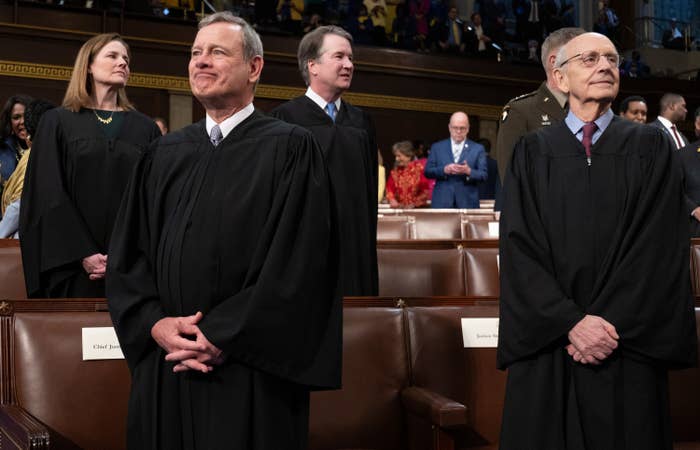
Congress is being urged to scrutinize the manner in which the Supreme Court probed the leak of its own draft opinion overturning abortion rights, including whether the nine justices received “special treatment” from investigators.
The Supreme Court’s Office of the Marshal released a report last week indicating they had so far been unable to pinpoint who was behind the May 2022 leak to Politico of Justice Samuel Alito’s draft majority opinion in Dobbs v. Jackson Women's Health Organization.
But concerns were raised that the marshal’s team did not require the justices to sign affidavits — as they had done with all other Supreme Court staff — swearing they had not been involved in the leak.
“The Supreme Court’s report on the Dobbs leak raised more questions than it answered — namely, why were the justices not investigated with the same rigor and to the same lengths as every other employee of the Court?” Sarah Lipton-Lubet, president of the left-wing group Take Back the Court Action Fund, told BuzzFeed News in a statement.
On Thursday, Lipton-Lubet’s group sent a letter to Senate Judiciary Chair Dick Durbin, a Democrat, and Rep. Jim Jordan, the new Republican chair of the House Judiciary Committee, urging their respective committees to hold oversight hearings investigating “whether the justices received special treatment.”
“Unfortunately, the Court has proven time and again that it is incapable of policing itself,” the letter states. “As such, it falls to Congress to step up to its role as a coequal branch and provide the oversight that is so sorely lacking.”
As part of the investigation, the marshal’s office, which is normally mostly responsible for ensuring the justices’ security, conducted 126 interviews with 97 court employees, concluding that 82 of them had access to the draft, in addition to the nine justices. But the investigation focused mainly on personnel such as law clerks or other employees, rather than the justices.
(Justice Stephen Breyer was still on the court at the time, having not yet been replaced by Justice Ketanji Brown Jackson).
In a follow-up statement last week, Marshal Gail A. Curley said she did not believe it was necessary to ask the justices to sign sworn affidavits, as the other court workers had been required.
“During the course of the investigation, I spoke with each of the Justices, several on multiple occasions,” Curley said. “The Justices actively cooperated in this iterative process, asking questions and answering mine. I followed up on all credible leads, none of which implicated the Justices or their spouses.”
The letter from Take Back the Court highlighted the attention that had been directed toward Justice Alito following a New York Times report from November that revealed a former anti-abortion leader had learned of the outcome of another Alito-majority decision in 2014 prior to its public release after his friends dined with the justice and his wife. Lipton-Lubet’s letter to lawmakers queried whether Alito was questioned about this 2014 matter and whether his contacts with anti-abortion activists were studied.
“Supreme Court employees would be vulnerable to a wide range of sanctions, including termination of employment and damage to future career prospects, if they are found to have misled the Marshal’s investigation. By contrast, the justices enjoy lifetime appointments and are virtually impossible to remove from office,” Lipton-Lubet wrote.
“Why, then, did the Marshal think the additional threat of legal jeopardy was necessary to ensure honest cooperation by Court staff, while declining to subject the justices to the same legal vulnerability?” Lipton-Lubet added.
Representatives for Durbin and Jordan didn’t respond to requests for comment.
Jordan, who took control of his committee when Republicans gained a thin majority in the House of Representatives in November’s midterm elections, has said he wants to hold hearings on other matters involving the FBI, immigrants crossing the border with Mexico, and President Joe Biden’s storage of classified documents at his private home.
But Rep. Darrell Issa, a California Republican and member of the committee, has indicated he wants further scrutiny of the leak.
“The Supreme Court leak is not case closed,” Issa said on Twitter last week. “Congress must investigate in an appropriate and comprehensive way.”
